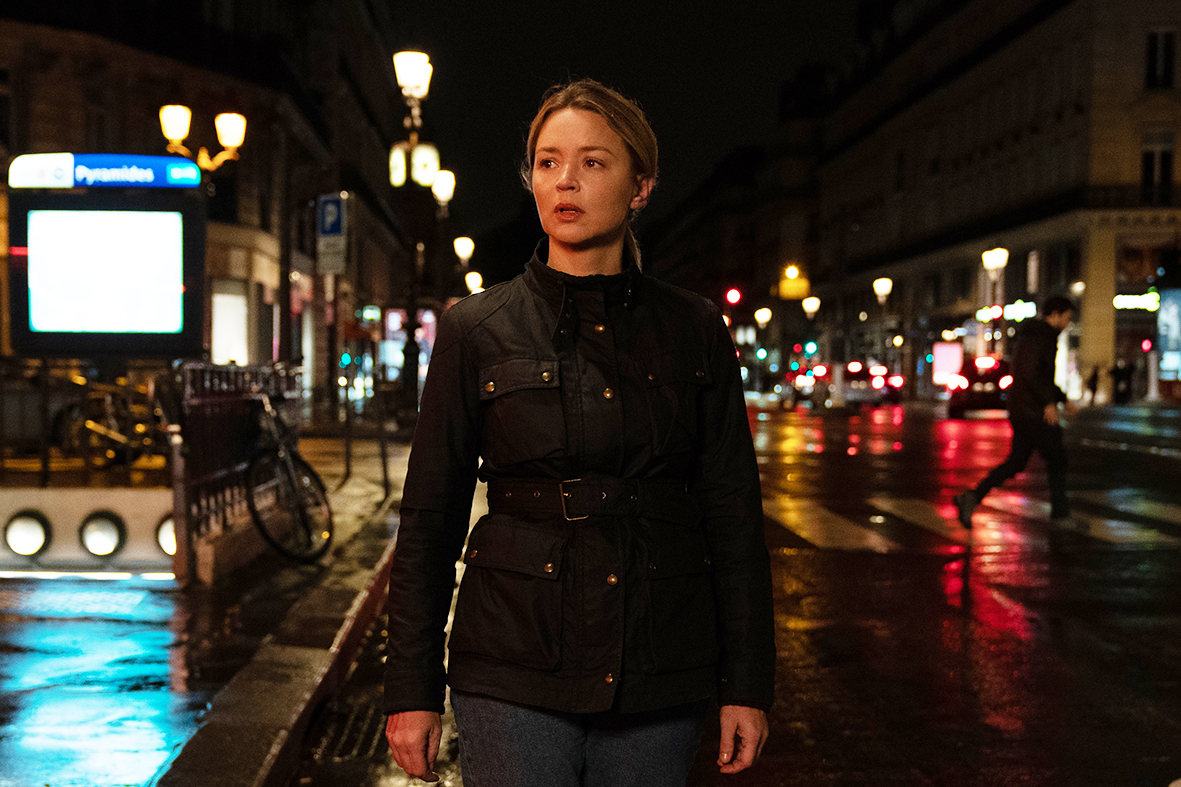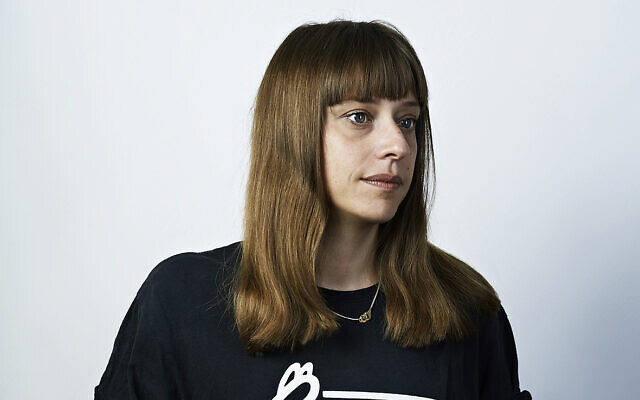‘Paris Memories’ evokes the trauma of the terror attacks in the French capital
Filmmaker Alice Winocour brings her family's personal experience to bear in her new fmovie
On the night of 13 November 2015, French filmmaker Alice Winocour sat helplessly holding a friend’s hand for comfort as her brother Jeremie hid from ISIS terrorists after they attacked during the concert he was watching at the Bataclan theatre in Paris. He had asked her to stop phoning, fearing that he would be discovered. Now all she could do was wait, and hope for good news.
Ninety people were murdered at the Bataclan, in one of a number of coordinated attacks that left 130 dead in total, but Jeremie survived. Eight years later, born from this personal trauma and dedicated to her brother, Winocour’s latest film, Paris Memories, explores the “healing process” following such an experience. In the movie a journalist called Mia (Virginie Efira) finds herself in an attack while sheltering from the rain in a busy Paris bistro.
Winocour’s brother told her that terrorist violence was beyond representation because even the worst horror-movie violence could not compare to the reality, so she tried creating something that felt abstract and psychologically impactful. “I didn’t want to make a film about the specific attack or what it means in history. I didn’t want to make a historical reconstruction,” she tells me over Zoom. “It was more about the human aspects of the trauma.”

Shot from Mia’s point of view, the scene is short and harrowing. She lies face down in broken glass; there are screams, gunfire, an explosion. Bodies drop, already dead or dying. She sees a gunman’s feet, never his face. A mobile buzzes, provoking a mortal shot. Suddenly, the screen goes black.
Weeks later, Mia returns to the scene of the atrocity, unable to remember anything. With the help of other survivors, she begins to make sense of the fragments of memory that flash up in her consciousness, and to move towards finding something positive in the darkness – “the diamond in the trauma”, one character calls it.
Winocour knows this trajectory well from not only her brother’s experience, but from the entanglement of tragedy and beauty in her own family history. “It is really part of my DNA,” she says. Her father lost three grandparents in the Holocaust, and she was very close to her paternal grandfather, who had been a refugee in France after his parents escaped pogroms in their small Ukrainian village of Berdichev, and survived Auschwitz. To her, he symbolised resilience.
“He was the most happy person I’ve ever met,” she says smiling. “He was really an example and someone very, very important in my life. I think about him almost every day.”
Her grandmother, who died last year aged 100, was also a big presence. Winocour says she was practically raised by her, and she was one of the first people that her brother opened up to after the Bataclan attack. She was sent to America for her safety, and lived in San Francisco throughout the war. Her father decided not to leave. “But it was the wrong choice,” says Winocour. “He didn’t survive. My grandmother felt really guilty not having stayed with her father, so she often told me the story of how, when she returned to France to look for living relatives – there were none – she crossed paths with my grandfather. They were not coming at all from the same worlds, but when they met they fell in love in one week, and it was really a very, very strong and beautiful love story.
“So, love and beauty can rise from a tragedy, and also from the trauma, because if the war hadn’t happened, and all this tragedy, they wouldn’t have met and I wouldn’t be here to tell you their story.”

This familial “diamond in the trauma” is echoed in Paris Memories by the romance that develops between Mia and another survivor of the bistro attack, played by Benoit Magimel. While one of the film’s more predictable elements, their story carries Winocour’s desire for it to be about “the passion for life, more than about death”.
Her grandparents came from very different backgrounds, and she says that the love they found together showed her how “traumatic experience crashes the barriers, including social barriers, between people”. Thus, when Mia discovers that the man who held her hand and kept her calm as they hid from the gunmen was an undocumented migrant worker, it takes her, the film and us into a world of people who are usually invisible.
Ghosts of the terrorists’ victims often appear to Mia, but these are “the real ghosts of the city”, says Winocour – a point emphasised by her use of documentary footage of people sleeping rough as drivers and pedestrians pass by them, apparently indifferent to their situation.
“To me it’s so violent in Paris, in every big city, to see those two worlds coexisting without meeting each other,” says Winocour. “I think now today we’re really, really stuck in our independent, modern and contemporary individualism, and especially also in France and in Europe with the rise of extremism, and communities that are against each other.”
Paris Memories foregrounds human connection and the community spirit that Winocour discovered among survivors. Instead of breaking people apart, she found during her research that terrorism brought victims from different classes and walks of life closer together, just as the Holocaust had done with her grandparents.
“There were many, many stories of people that were so moving to me to see. Like I heard that a few days after the [Bataclan] attack, everyone was looking for each other, asking about a person that they had just met for one second, who had helped them to reach a place, or they had seen this person covered in blood and they were asking if they had survived and they wanted to meet.”
The question that seems to hang in the air is, why can’t we be like this all of the time? Why must it take an extreme, life-threatening event for us to see and care about each other, as individuals and as a society? Paris Memories doesn’t have any answers, but it is a moving and thoughtful work in which humanity triumphs over barbarity.
Paris Memories is released in cinemas on 4 August

Thank you for helping to make Jewish News the leading source of news and opinion for the UK Jewish community. Today we're asking for your invaluable help to continue putting our community first in everything we do.
For as little as £5 a month you can help sustain the vital work we do in celebrating and standing up for Jewish life in Britain.
Jewish News holds our community together and keeps us connected. Like a synagogue, it’s where people turn to feel part of something bigger. It also proudly shows the rest of Britain the vibrancy and rich culture of modern Jewish life.
You can make a quick and easy one-off or monthly contribution of £5, £10, £20 or any other sum you’re comfortable with.
100% of your donation will help us continue celebrating our community, in all its dynamic diversity...
Engaging
Being a community platform means so much more than producing a newspaper and website. One of our proudest roles is media partnering with our invaluable charities to amplify the outstanding work they do to help us all.
Celebrating
There’s no shortage of oys in the world but Jewish News takes every opportunity to celebrate the joys too, through projects like Night of Heroes, 40 Under 40 and other compelling countdowns that make the community kvell with pride.
Pioneering
In the first collaboration between media outlets from different faiths, Jewish News worked with British Muslim TV and Church Times to produce a list of young activists leading the way on interfaith understanding.
Campaigning
Royal Mail issued a stamp honouring Holocaust hero Sir Nicholas Winton after a Jewish News campaign attracted more than 100,000 backers. Jewish Newsalso produces special editions of the paper highlighting pressing issues including mental health and Holocaust remembrance.
Easy access
In an age when news is readily accessible, Jewish News provides high-quality content free online and offline, removing any financial barriers to connecting people.
Voice of our community to wider society
The Jewish News team regularly appears on TV, radio and on the pages of the national press to comment on stories about the Jewish community. Easy access to the paper on the streets of London also means Jewish News provides an invaluable window into the community for the country at large.
We hope you agree all this is worth preserving.






















